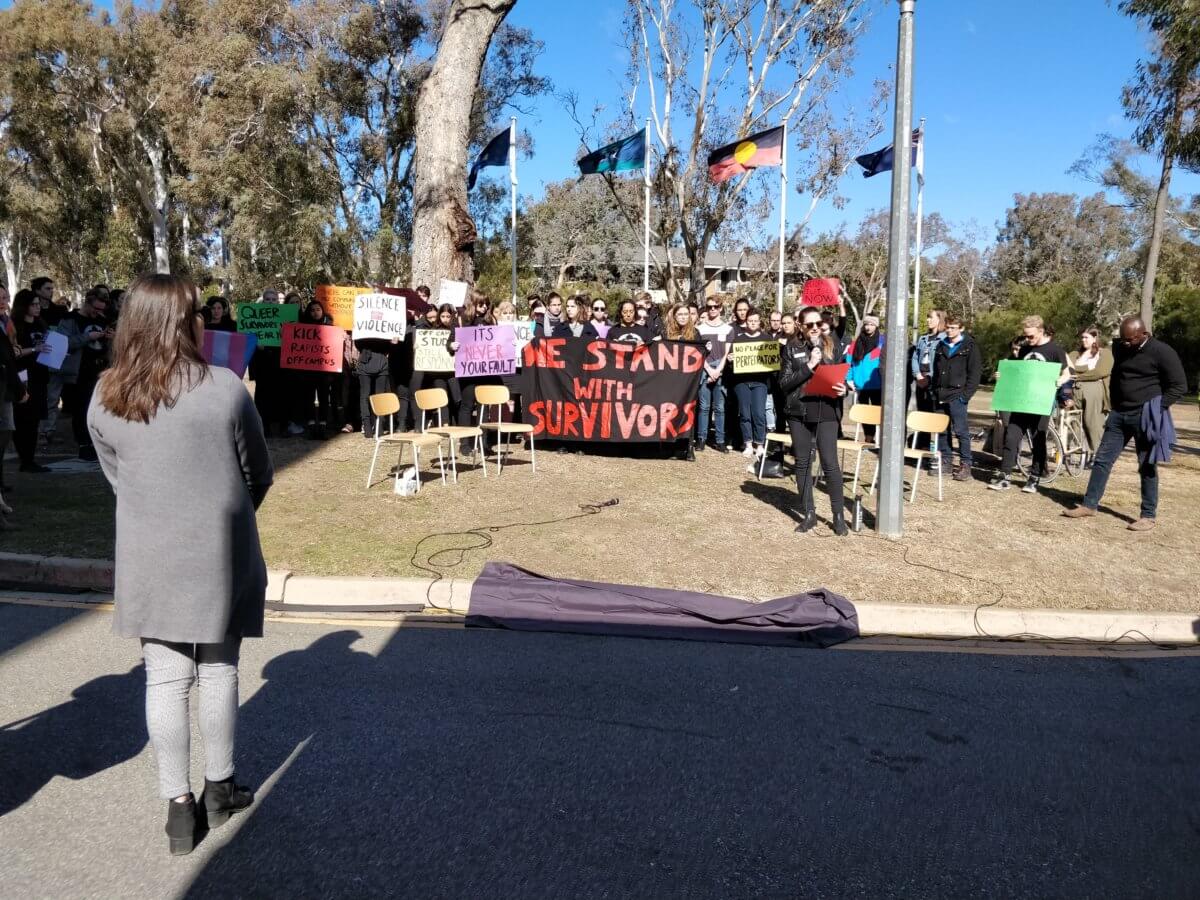1 August 2018 marks one year since the AHRC Report into Sexual Assault and Harassment on Australian University campuses was released. ANUSA and PARSA held a joint protest, vigil for survivors and released a report titled ‘Surveys but No Service’.
The protest was held in front of the Chancelry, where it was held on the same day last year. It featured a gamut of moving speakers who shared their experiences and perspectives of sexual harassment and/or assault, and the shortfalls of the University’s responses to the report.
The speakers levelled criticism at the University for failing to enact meaningful change and its “institutional mishandling of [survivors’] experiences”. They stated that the process of disclosure of sexual violence is still “depressing and exhausting” and that it was “torture” to “recount [their] story over and over again”.
The protest was capped off in a moment of solidarity and vigil in which 116 candles were placed for the 116 counts of sexual assault experienced by ANU students in 2016.
The report drafted by ANUSA and PARSA invites the University to “work with [them] to make make change”. It states that though the University has done work to comply with the recommendations of the AHRC Report, most of those actions have been reviews, surveys and studies, instead of “meaningful action to promote positive change.”
In particular, the report calls for:
-
“Accessible and comprehensive” communication from the University in regards to their actions to satisfy the AHRC report recommendations;
-
Comprehensive training resources for the University community;
-
Development of an online sexual violence disclosure tool;
-
Support for marginalised communities and individuals;
-
Cultural change campaigns and adoption of ANU Community Standards;
-
Implementation of restorative justice practices; and
-
Better collaboration with student advocates.
ANU has actioned some engagement with these issues: however, as the report states, and the University has admitted, progress is slow and there is still more to do.
The AHRC report provided a damning insight into sexual assault and harassment at ANU, with at least 116 counts of sexual assault to ANU students in 2016, of which 52 were on campus. It found that ANU had the highest rate of sexual harassment in Australian universities and second highest rate of sexual assault.
In response, the University has put in a set of measures to implement change. For example, pastoral care institutions and staff have received further training on dealing with disclosures of sexual violence and contacting appropriate support services, such as the Canberra Rape Crisis Centre (though this was largely a student initiative). More recently, a survey was sent out to current and previous students of residences through a firm contracted by ANU to find out how to make the residences “more supportive and inclusive”.
Woroni is committed to standing with survivors of sexual harassment and assault. If you or someone you know have been affected by this piece, please reach out to the support services listed.
Canberra Rape Crisis Centre (6247 2525)
CRCC are on campus and available to support you if you have experienced sexual violence, harassment, or anything that has made you feel uncomfortable. You don’t need a medicare card to see them, all appointments are free, and nobody will be told you have spoken to them. You can call CRCC on 6247 2525 between 7am and 11pm.
ANU Counselling
The ANU Counselling Centre promotes, supports and enhances mental health and wellbeing within the University student community. It is a free, confidential and non-diagnostic service available to all currently enrolled ANU students. No referral or Mental Health Treatment Plan from a General Practitioner is required to attend appointments.
http://www.anu.edu.au/…/…/counselling/anu-counselling-centre
1800RESPECT
Provides support for people experiencing, or at risk of experiencing, sexual assault, domestic or family violence, their friends and family, and workers and professionals supporting someone experiencing, or at risk of experiencing sexual assault, domestic or family violence. Call 1800 737 732.
https://www.1800respect.org.au/about-1800respect/
Lifeline (13 11 14)
A national charity providing all Australians experiencing a personal crisis with access to 24 hour crisis support and suicide prevention services. Call 13 11 13.
ANU Women’s Department
Contact the Women’s Officer, Laura Perkov:
- For non-urgent inquiries: sa.womens@anu.edu.au
The Women’s Department is part of ANUSA, and it advocates for and supports all ANU Women and non-binary students. As Women’s Officer, Laura can provide pastoral care, referrals to local support services, and give information about options for reporting within ANU and the support ANU can offer.
ANU Queer* Department
Contact the Queer* Officer, Matthew Mottola:
The Queer* Department is part of ANUSA, and it advocates for and supports all Queer* identifying students. Matthew can provide pastoral care, referrals to local support services, and give information about options for reporting within ANU and the support ANU can offer.
We acknowledge the Ngunnawal and Ngambri people, who are the Traditional Custodians of the land on which Woroni, Woroni Radio and Woroni TV are created, edited, published, printed and distributed. We pay our respects to Elders past and present. We acknowledge that the name Woroni was taken from the Wadi Wadi Nation without permission, and we are striving to do better for future reconciliation.
